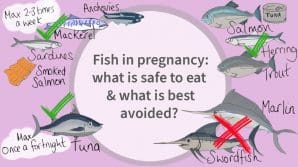Postpartum and Breastfeeding Nutrition
Nutritional Therapist Laura Southern shares tips for achieving a healthy breast milk supply, and which foods are particularly important to be consuming postpartum.
How do I ensure I have a healthy breast milk supply?
It is really important to eat! New mums often feel there’s no time for anything, and eating falls into this category. If you don’t eat properly then you’ll feel lousy, and everything will feel even harder. If you’re breastfeeding then the good news is that you can eat more than usual! Your body needs about 500 extra calories a day to make your milk supply. You want to get these extras from nutrient dense foods; nuts, seeds, avocado, fresh coconut, olives – they’re all rich in good fats to help with milk supply.
I don’t have time to make big meals, how can I make sure I am eating enough?
Put some structure in your day by aiming for 3 meals at regular meal times. You need to look after yourself so you’re strong enough to look after your baby. To maximise eating well with limited time fill your fridge with foods like hummus, vegetable sticks (pre cut is fine), olives, fresh coconut and eggs. Tinned fish and an avocado takes a few seconds to prepare but packs a nutrient dense lunch. Put raw nuts into a bowl with some dates and dried figs to nibble on during the day.
Which foods are important for an adequate milk supply?
- To ensure adequate breast milk your diet needs a good balance of protein carbs and healthy fat. Whole grain carbohydrates, especially oats, barley, brown rice and wholewheat are all high in galactans which give a great boost to milk production.
- Aim for oats in the morning, a soup or salad with barley at lunch, and brown rice at dinner. Ditch the white refined stuff during this period as it will fill you up without giving you many nutrients.
- Certain fruits and veggies are also very helpful to increase milk supply – fennel, beetroot, spinach, garlic and papaya.
- Iron rich foods are also important to support blood flow for breast milk manufacture. Small amounts of red meat, lots of legumes and pulses, and lots of dark green leaves and veggies.
- Only include foods which are suitable to any dietary needs, intolerances or allergies that you may have.
I am worried about eating more as I want to lose my baby weight.
It’s important not to think about weight loss yet. Maximise your nutrients, try to resist or limit high sugar foods (very hard when you’re sleep deprived I know!) and the weight should slowly fall off. Regular walking with the baby in its pram will help both of you as sunlight can help set the baby’s sleep patterns.
As part of our Early Pregnancy Care Package we offer a nutrition consultation with Laura. If you do have any further questions please give us a call on 0207 10 11 700.
